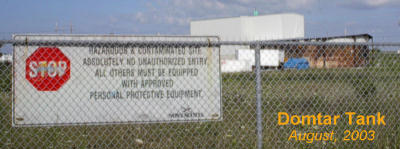Hazardous waste products arriving from Nova Scotia for incineration in Mercier are being sent here from a firm recognized as being the most dangerous toxic waste plant in Canada.

The TSRI (Toxic Substances Research Initiative) labels Sydney Tar Ponds as much in a report published by Health Canada.
A recent study by the People's Health Commission, the Canadian doctors' association for the environment, and the International Institute of Concern for Public Health, demonstrates that the dust sample in three neighboring districts of the tar ponds contains lead and arsenic concentrations that are higher than directives laid down by the Canadian Council of Environment Ministers.
Far from being reassured by their municipality's official position on the issue of toxic sludge being incinerated by Clean Harbors in Mercier, citizens of that town continue to call for an injunction in an effort to stop the treatment of 1,000 tonnes of tar oil coming from Nova Scotia.
In the name of concerned Mercier residents, Jeannine Breault has written a letter to that effect to Chateauguay MNA Jean-Marc Fournier. She has also written to Premier Jean Charest; the federal and provincial environment ministers, as well as to Mercier Mayor Jean-Luc Colpron and his town councillors.
She is demanding an immediate halt to the treatment of these toxic waste products and that citizens of Mercier and surrounding areas, chosen by their peers, should be allowed to take part in meetings and discussions on the subject.
Fournier is also following the dossier closely. However, he does not believe he is able to suspend the incineration of the hazardous materials in Mercier for the moment. "The company holds all the permits and certificates necessary to proceed," he points out. "We would require new information in order to take action. What I have requested now is an opinion from the Public Health Department. I have been assured that this will be rapidly forthcoming."
He added that the government could not act on the word of the Environment Ministry alone on this particular issue.
The Mercier Decontamination Coalition, a conglomerate of environmental groups in the province, has also written to Premier Charest to express its concerns.
"The very nature of these waste products worries us, mainly because of the presence of heavy metals such as lead and arsenic," the Coalition wrote. "Certain information also leads us to wonder about the presence of PCBs. That's why we believe it is pertinent for the Quebec Environment Minister to proceed with a detailed breakdown of the waste products that are destined for Mercier.
The ecologists would also like the substances emanating from the incinerators' chimneys to be the objects of an independent surveillance program.
Meanwhile, contrary to what Le Soleil indicated last week, the Coalition is not advocating the use of mobile incinerations as a solution. Instead, the Coalition is pushing for new chemical treatments that are considered more efficient and safer.
"We are against all forms of incineration of toxic wastes everywhere, not only in Mercier," explained Coalition co-ordinator Michel Preville. "The negative impact of the incineration of such waste products has already been demonstrated."(Tr:D.R.)
